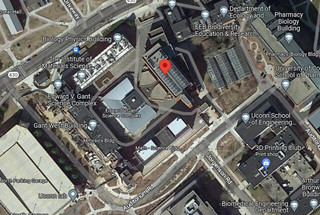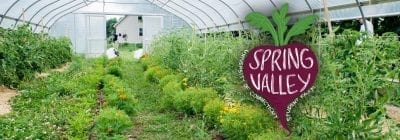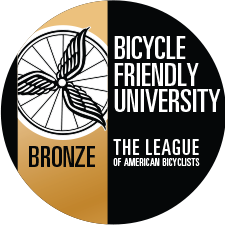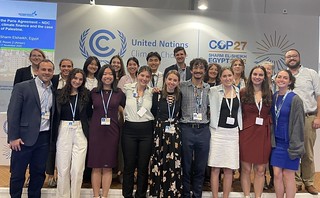The Environmental and Social Sustainability Small Grants Program, run by the Office of Sustainability and Institute of the Environment, awarded seven student teams working to elevate sustainability in Connecticut.

UConn has ambitiously committed to being carbon-neutral by 2030, and has a successful track record of incorporating sustainability into its operations, education and student opportunities. Students play an important role in elevating sustainability at UConn, and the latest round of Environmental and Social Sustainability Small Grants (ESSSG) awards supports them.
Started by the Office of Sustainability and Institute of the Environment in 2021, the ESSSG program competitively funds student-led initiatives that enhance environmental and social sustainability for UConn communities. Applications for this round spanned everything from graduate-level engineering research to planet-friendly farming practices.
Seven projects were awarded funds due to their interdisciplinary nature and ability to advance both sustainability and equity.
Non-Violence Mindfulness Training for Environmental Justice and Mother Earth Day Festival
This project will offer non-violence embodiment training to students, held by students and national experts. It’ll culminate in a campus event around Mother Earth Day for the students and other groups to showcase art and connect to the UCONN community by teaching embodiment and non-violence.
- Students: Juan Pablo Yepes Tobon ’24 (CLAS), Laura Augenbraun ’24 (CLAS)
- Faculty Mentors: Phoebe Godfrey, Professor-in-Residence of Sociology, Stacy Maddern – Assist. Professor-in-Residence of Urban and Community Studies
Renewed Outdoor Classroom and Chestnut Orchard
Locally and sustainably-sourced raw materials will be produced by students to create infrastructure for teaching, outreach, meeting, and artistic performance space that is ADA accessible. This project will also materially advance development of a planned American chestnut seed orchard.
- Students: Isaac Betts ‘23 (CAHNR), Andrew Muller ’23 (CAHNR), Zachary Bates ‘23 (CAHNR)
- Faculty Mentors: Thomas Worthley, Extension Educator Forest Sustainability, Robert Fahey, UConn Forest Director and Assoc. Professor
Huskies for Harkness
Huskies for Harkness is an initiative immersing New London high school students into conservation and sustainability, addressing the systemic barriers surrounding historically gatekept fields. It does this through a vocational enrichment trip to Harkness Memorial Park, focusing on education, engagement, and exploration.
- Students: Jessica Bostick ‘23 (CAHNR), EcoHuskies
- Faculty Mentor: Eleanor Shoreman-Ouimet, Assist. Professor of Anthropology
UConn Gleaning Corps
The Spring Valley Student Farm Gleaning Interns will assist the Windham Community Food Network to expand gleaning in Eastern CT. Gleaning is the practice of harvesting excess produce that doesn’t get sent to market, and is instead used to support people experiencing food insecurity. The student farmers will harvest, wash and deliver produce to various pantries in the Willimantic area. They’ll also develop a training guide to be used by volunteers to keep the program running in the future.
- Students: Sydney Clements, Ph.D. Candidate in Geography
- Staff Mentor: Jessica Larkin-Wells, Farm Manager, Spring Valley Student Farm
Reimagining a Community Garden
EcoGarden is reimagining the student club’s garden space. Educational signage, a new composting area, a variety of new perennial plants, and an outdoor picnic area are coming to EcoGarden. Community gardens help tackle the issues of climate change and food deserts.
- Students: Kristopher Dow ’24 (ENG, CLAS), EcoGarden Club
- Staff Mentor: Jessica Larkin-Wells, Farm Manager, Spring Valley Student Farm
Ecoposium, UConn
Ecoposium, UConn is an organization that serves to plan and promote UConn’s first student-led environmental symposium. The club strives to spread awareness and educate the UConn community about relevant environmental issues through symposium sessions covering environmental topics elected by the organization.
- Students: Claire Lee ’24 (CLAS), Ecoposium Club
- Faculty Mentors: David Wagner, Professor of Ecology & Evolutionary Biology, Scott Wallace, Assoc. Professor of Journalism
Material World: Design for a Healthful and Equitable Future
This project will create an interactive and sustainably-built pop-up exhibition educating students on the impacts of environmentally and socially sustainable design methods and materials aimed at empowering them to act as agents of change in their professional careers and personal lives.
- Students: Cameron Slocum ’23 (SFA)
- Faculty Mentors: Chris Sancomb, Assist. Professor of Industrial Design, Shareen Hertel, Professor of Political Science
“This signature program catalyzes and supports entrepreneurial activities by students, who co-design projects with faculty and staff mentors. The resulting projects represent authentic, collaborative experiences that substantively enrich educational experiences and that enhance sustainable practices that intimately integrate social responsibility. It is clear that our students are making a difference and are leading efforts to make the world more just and more resilient!”, says Michael Willig, Executive Director of the Institute of the Environment.
“Despite “small” in being in the name of this grant program, I believe that these grants will leave a large impact on our community, even beyond the environmental sphere. Thanks to the Office of Sustainability, the hard work of our team at Ecoposium, UConn, and the endless support of our faculty advisors, we are excited to utilize these funds in supporting the university’s first student-run environmental symposium this semester. My hope is for members of the UConn community from all disciplines to be able to come together through this event under a shared love and commitment to the environment,” shares Claire Lee, president and founder of student organization Ecoposium, UConn.
Students will present their project findings and impacts at the Climate Change Café in early Spring’24.
For more details on the Environmental and Social Sustainability Small Grants Program, please visit: https://sustainability.uconn.edu/environmental-social-sustainability-small-grants-program/





 As I reflect on my experience attending COP27, there are several key takeaways I would like to discuss. My first takeaway is that I believe this experience is invaluable for both UConn graduate and undergraduate students and provides a transformative real-world component to their experience at UConn. Specifically, the UConn@COP Fellowship Program provides students direct exposure to learn about international policy negotiations, network with diplomats and business leaders, and connect with people from cultures around the world at an unparalleled scale. In 1995, COP1 had just under 4,000 attendees but this number has continued to swell with almost 50,000 attendees at COP27 making it by far the largest diplomatic gathering on earth. The scale of this conference reflects the overwhelming consensus by over 190 countries for the need to address climate change and the tremendous opportunity for students to derive value from attending this event as a springboard for professional development.
As I reflect on my experience attending COP27, there are several key takeaways I would like to discuss. My first takeaway is that I believe this experience is invaluable for both UConn graduate and undergraduate students and provides a transformative real-world component to their experience at UConn. Specifically, the UConn@COP Fellowship Program provides students direct exposure to learn about international policy negotiations, network with diplomats and business leaders, and connect with people from cultures around the world at an unparalleled scale. In 1995, COP1 had just under 4,000 attendees but this number has continued to swell with almost 50,000 attendees at COP27 making it by far the largest diplomatic gathering on earth. The scale of this conference reflects the overwhelming consensus by over 190 countries for the need to address climate change and the tremendous opportunity for students to derive value from attending this event as a springboard for professional development.